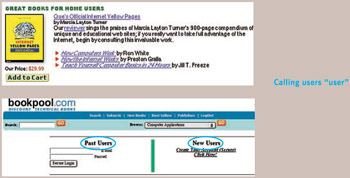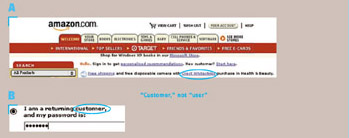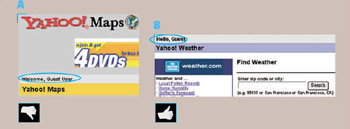Blooper 43: Calling Site Visitors User
| < Day Day Up > |
Blooper 43: Calling Site Visitors " User "
One form of speaking geek is so common that I consider it a blooper of its own: websites that refer to site visitors as "users."
"Users" is what we ”software and Web developers ”call people who use our systems. It's a fine term to use when we are talking with other developers. It's part of our professional jargon ”our way of communicating succinctly with peers. But "users" is not how people refer to themselves . Well, maybe heroin and cocaine users refer to themselves as "users," but nobody else calls themselves that.
Websites should be designed from the point of view of the people who will use the website, not that of the site's designers or developers. Therefore, websites that call users "user" to their face are committing a blooper.
Consider BarnesAndNoble.com and BookPool.com. Both use the word "user" to refer to the people who visit their sites (Figure 6.17). BarnesAndNoble's Computer Books page uses the ambiguous phrase "Home Users" ”does this mean people who use homes , people who use computers at home, or people who use BarnesAndNoble.com at home? Almost as bad, BookPool.com calls its visitors "Past Users" or "New Users" depending on whether they've registered.

Figure 6.17: Calling users "user" ”(left) BarnesAndNoble.com (Jan. 2002) uses geeky and ambiguous term "Home Users." (right) BookPool.com (Jan. 2002) calls visitors "Past Users" or "New Users" depending on whether they've registered.
A more blatant form of the blooper is exhibited by FinancialEngines.com (Figure 6.18[A]): It doesn't just call site visitors "user," it makes them refer to themselves as "user" (Figure 6.18[B]). The home page commits the normal form of the blooper by asking "First time users" to "start here." The Advice page asks visitors to classify themselves to help guide the site's investment advice, with "An individual user" as one of the available options.

Figure 6.18: www.FinancialEngines.com (Mar. 2002) ” A ” Home page says "First time users? Start here." B ” Advice page asks site visitors to classify themselves. One classification is "individual user."
Calling users "user" to their face is an easy mistake to make: "User" is developers' jargon for people who use the website. If a development team doesn't explicitly think about this and choose a more appropriate word, "users" is the word that will be used. That's why this blooper is so common. Other websites that (as of February 2002) call their users "user" include Continental.com, eBay, ITN.net, Learn2.com, and VitaminShoppe.com.
Avoiding the Blooper
As easy as it is to make this blooper, it's just as easy to avoid or correct it. It just takes awareness and a few moments of thought.
In contrast to BarnesAndNoble.com and BookPool.com, their competitor Amazon.com uses the more appropriate and less geeky term "customer" (Figure 6.19).

Figure 6.19: www.Amazon.com (Jan. 2002) ” A ” Home page says "New Customer? Start here ." B ” Login page uses the term "customer."
It is instructive to look at two contrasting subsites of Yahoo.com: One commits the blooper; the other avoids it. Yahoo Maps greets unregistered visitors with "Welcome, Guest User" (Figure 6.20[A]). Yahoo Weather greets them with "Hello, Guest" (Figure 6.20[B]). Yahoo Weather's greeting is shorter and less geeky. Yahoo ”and other companies ”should consider corporate standards for addressing site visitors.

Figure 6.20: www.Yahoo.com (Apr. 2002) ” A ” maps.Yahoo.com ” "Welcome, Guest User." B ” weather.Yahoo.com ” "Hello, Guest."
Using sensible words like "customer" and "member" instead of "user" costs next to nothing. Any company or organization could do it. Three more websites that avoid the blooper are AmericanAirlines.com (Figure 6.21[A]), HauteAtHome.com (Figure 6.21[B]), and WalMart.com (Figure 6.21[C]).
Because this blooper is so easily avoided and corrected, there is no valid excuse for calling users "user" in a website.

Figure 6.21: A ” www.AA.com (Feb. 2002); B ” www.HauteAtHome.com (Jan. 2002); C ” www.WalMart.com (Jan. 2002) ”Sites that don't call users "user."
| < Day Day Up > |
EAN: 2147483647
Pages: 128